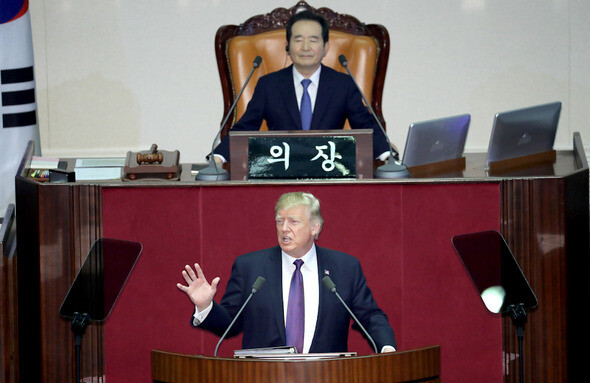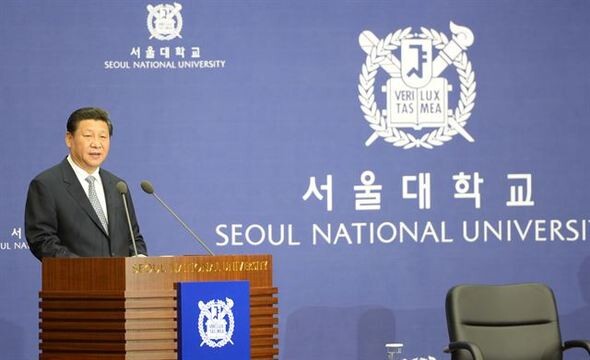hankyoreh
Links to other country sites 다른 나라 사이트 링크
[Correspondent’s Column] Trump’s visit to Seoul brings back memories of Xi’s trip three years ago

Seeing US President Donald Trump’s first visit to South Korea brought up images of Chinese President Xi Jinping’s visit around three years ago. In both cases, the visits lasted two days. Just as some South Korean observers voiced worries about Trump spending less time here than in his three-day visits to China and Japan, so there were those who fretted about Xi’s schedule as well. Back then, Xi was preparing to visit South America to attend a summit of BRICS nations (Brazil, Russia, India, China, and South Africa).
The worry was that Xi would be merely passing through South Korea on his way to South America, treating it as a secondary stop. In the end, their fears were put to rest when it was arranged for Xi to visit South Korea only. With Trump’s visit, there were no schedule adjustments. Some news reports suggested his decision not to set much of a schedule for his third day in Japan was a gesture toward Seoul, but it did not allay the worries. Many in South Korea anxiously compared the various protocols and schedules, fearful that the US and China might neglect the country.
While all of that may be important, what was more concerning about Trump and Xi’s South Korea schedules were the hints they gave in respectively addressing North Korea and Japan. Both leaders gave speeches and talks in which they spoke out boldly on things they hadn’t mentioned when they were with the South Korean president. They may have confined themselves to predetermined remarks in diplomatic settings where only pre-coordinated opinions were voiced – but on their own stages, they played fully into their respective images.
Trump has not been shy with his harsh rhetoric toward North Korea since being elected last year, but in his Nov. 7 summit with South Korean President Moon Jae-in, the restraint was evident in his remarks about “work[ing] together to resolve this problem using all available tools short of military action.” Even the US media were startled at the change in tone. It didn’t last.
His National Assembly speech the next day was, for the most part, little different from the grim recollections offered by North Korean defectors. This naturally segued into a characterization of North Korea as a “hell” and its leaders as “tyrants.” Trump’s hardline colors remained intact.

During Xi’s South Korea visit in July 2014, much attention was focused on what kind of message Seoul and Beijing would send to Japan. The two sides were closely cooperating at the time on a joint response to historical issues involving Japan, raising concerns in the US and Japan and among South Korean conservatives that Seoul was leaning too hard toward Beijing. In what may have been a gesture toward this, the two leaders avoided mentioning Japan in their joint statement. The two sides’ “cooperation” on historical matters seemed to be ebbing. It didn’t last.
In a talk at Seoul National University the following day, Xi brought up Japanese invasions of Korea in the late 16th century and the Second Sino-Japanese War in the 20th, stressing that South Korea and China’s history was one of close friends battling against Japan. Nothing had changed in terms of Xi’s attempts to draw South Korea out of Japan’s orbit – and the US’s – and into its own.
Things like Trump’s National Assembly speech and Xi’s SNU talk must have come as a huge shock to the people who spent so much effort on discussions and formalities for the summits. But they’re also things that can happen when strategic frameworks and core interests remain unchanged. We can compare diplomatic achievements to mixing ingredients in a recipe: sometimes they end up on the table raw.
Moon’s second summit with Xi has been announced. He seems to walking a nice red carpet right now with the two sides mending fences over the THAAD deployment issue. But there’s no sense of change so far in the northeast Asian strategic framework surrounding Trump’s visit, or in the everyday lives of Koreans in China. Moon’s shoulders seem yet to be carrying a heavy weight
By Kim Oi-hyun, Beijing correspondent
Please direct questions or comments to [english@hani.co.kr]

Editorial・opinion
![[Column] Season 2 of special prosecutor probe may be coming to Korea soon [Column] Season 2 of special prosecutor probe may be coming to Korea soon](https://flexible.img.hani.co.kr/flexible/normal/500/300/imgdb/original/2024/0426/3317141030699447.jpg) [Column] Season 2 of special prosecutor probe may be coming to Korea soon
[Column] Season 2 of special prosecutor probe may be coming to Korea soon![[Column] Park Geun-hye déjà vu in Yoon Suk-yeol [Column] Park Geun-hye déjà vu in Yoon Suk-yeol](https://flexible.img.hani.co.kr/flexible/normal/500/300/imgdb/original/2024/0424/651713945113788.jpg) [Column] Park Geun-hye déjà vu in Yoon Suk-yeol
[Column] Park Geun-hye déjà vu in Yoon Suk-yeol- [Editorial] New weight of N. Korea’s nuclear threats makes dialogue all the more urgent
- [Guest essay] The real reason Korea’s new right wants to dub Rhee a founding father
- [Column] ‘Choson’: Is it time we start referring to N. Korea in its own terms?
- [Editorial] Japan’s rewriting of history with Korea has gone too far
- [Column] The president’s questionable capacity for dialogue
- [Column] Are chaebol firms just pizza pies for families to divvy up as they please?
- [Column] Has Korea, too, crossed the Rubicon on China?
- [Correspondent’s column] In Japan’s alliance with US, echoes of its past alliances with UK
Most viewed articles
- 1No good, very bad game for Korea puts it out of Olympics for first time since 1988
- 2[Column] Season 2 of special prosecutor probe may be coming to Korea soon
- 3Korea’s 1.3% growth in Q1 signals ‘textbook’ return to growth, says government
- 4‘We must say no’: Seoul defense chief on Korean, USFK involvement in hypothetical Taiwan crisis
- 5Is N. Korea threatening to test nukes in response to possible new US-led sanctions body?
- 6Division commander ordered troops to enter raging flood waters before Marine died, survivor says
- 7[Column] ‘Choson’: Is it time we start referring to N. Korea in its own terms?
- 8Will NewJeans end up collateral damage in internal feud at K-pop juggernaut Hybe?
- 9Korea sees more deaths than births for 52nd consecutive month in February
- 10[Editorial] Korea’s surprise Q1 growth requires objective assessment, not blind fanfare